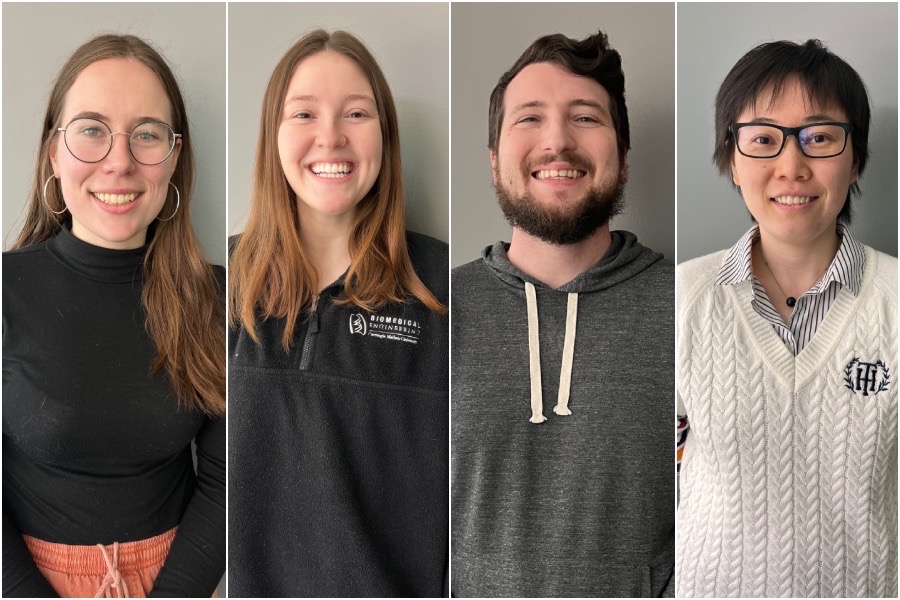
BME Graduate Students Honored with College of Engineering Fellowships
By Sara Vaccar
Of the 46 graduate students who have been awarded fellowships from the College of Engineering for the 2023-24 academic year, the department of biomedical engineering is proud to congratulate four of its own. Mabel Bartlett received the Neil and Jo Bushnell Fellowship; Lindsey Huff received the Presidential Fellowship; Adam Smoulder received the Bradford and Diane Smith Graduate Fellowship; and Yunhui Xing was awarded the Liang Ji-Dian Fellowship. Each of these prestigious fellowships are made possible by generous donors whose support allows the college to attract and support students who embody excellence and bring a variety of talents, experiences, and perspectives to the Carnegie Mellon University community.
Mabel Bartlett
Neil and Jo Bushnell Fellowship
Mabel works along Tzahi Cohen-Karni, associate professor of biomedical engineering and materials science & engineering, in the Cohen-Karni Lab, focusing on bioelectronics for understanding disease progression in DNA damaged cardiac tissues.
Her current research aims to create novel bioelectronic platforms for recording electrophysiological signals from cardiac tissues, specifically when DNA damage is occurring. Looking ahead, she anticipates designing platforms which can specifically be used to answer key biological questions about changes to cardiac signaling and function, to uncover the mechanisms at play when this damage accumulates.
“It is so exciting to receive this fellowship, as it gives me the opportunity to investigate some additional aspects of my research and hopefully attend conferences to network with those in the field of bioelectronics,” said Mabel. “Over the course of Ph.D., I hope to continue to develop novel platforms to investigate disease states in various electrically active tissues.”
Lindsey Huff
Presidential Fellowship
Lindsey works alongside Rosalyn Abbott, assistant professor of biomedical engineering and materials science & engineering, in the Abbott Lab, which aims to investigate how the 3D microenvironment affects tissue development and disease.
Presently, Lindsey is focusing on adipose tissue engineering for cellular agriculture applications, including the production of animal-sourced foods from cell culture, with the end goal of demonstrating the feasibility of 3D bioprinting high-end meat products without sacrificing an animal. To accomplish this, she is creating protocols to 3D-print Wagyu beef with lab-grown bovine adipocytes and myocytes using a dual-nozzle Freeform Reversible Embedding of Suspended Hydrogels (FRESH) bioprinter. In the future, she hopes to tailor the nutritional content in adipocytes by altering the fatty acids profile.
“I am very thankful to receive this fellowship and I am grateful to Dr. Abbott for showing me full support throughout my graduate school experience,” said Lindsey. “I love the sense of community and constant encouragement from the biomedical engineering department. There are also many opportunities to get involved in outreach and integrate with the Pittsburgh community.
Adam Smoulder
Bradford and Diane Smith Graduate Fellowship
Adam joins Steve Chase, professor of biomedical engineering and the Neuroscience Institute, to investigate how sensory feedback impacts the neural representation of motor intent.
Broadly, his research studies how changes in “internal states,” like motivation, wakefulness, and attention, affect the ability to control arm movements. To determine this, he records activity from neurons in brain areas known to control the limbs (i.e., the motor cortex) during challenging movement tasks, and then uses machine learning methods to relate changes in brain signals with changes in behavior driven by internal state modulations.
Throughout his research, he has found that the increase-then-decrease in performance with increased incentives can be preceded by an expansion-then-collapse of neural information about upcoming movements. In researching this relationship, he hopes to open the door to a deeper understanding of how both movement and internal state signals in the brain interact with one another and can potentially be harnessed.
“This fellowship award is an appreciated validation of the hard work I’ve put in so far and makes the directions my research is heading feel valued,” shared Adam. “I’ve learned how to do rigorous, thoughtful research, and how to present findings in a way that’s easy to understand. Carnegie Mellon University is part of a great academic community here in Pittsburgh, and our department is remarkably flexible to the diverse and specific research interests present under the ‘biomedical engineering’ umbrella.”
Yunhui Xing
Liang Ji-Dian Graduate Fellowship
Yunhui teams up with Charlie Ren, assistant professor of biomedical engineering, in the Ren Lab, which examines the interplay of stem cells and the extracellular matrix.
Currently, Yunhui’s research focuses on tissue regeneration and ways to enhance the regenerative potential of extracellular matrix (ECM) hydrogels using click chemistry by functionalization with bioactive cargos, which includes growth factors and extracellular vesicles. Based on metabolic engineering, she is helping to develop a platform to chemoslectively immobilize bioactive cargos onto click reactive ECM, which in the future, may potentially be applied to various ECM materials and bioactive cargos.
After her anticipated graduation at the end of the year, Yunhui plans to continue her current research focus, ideally in an industry setting where she can experience new research environments and see the translation from her research to products that can help patients in need.
“I am very grateful for receiving this fellowship; it is accomplishing to have my research recognized and it also gives me more confidence to continue future pursuits,” noted Yunhui. “The biomedical engineering department is like a big family, and I really enjoy it here. We have great opportunities to collaborate with a lot of different labs from diverse research areas.”